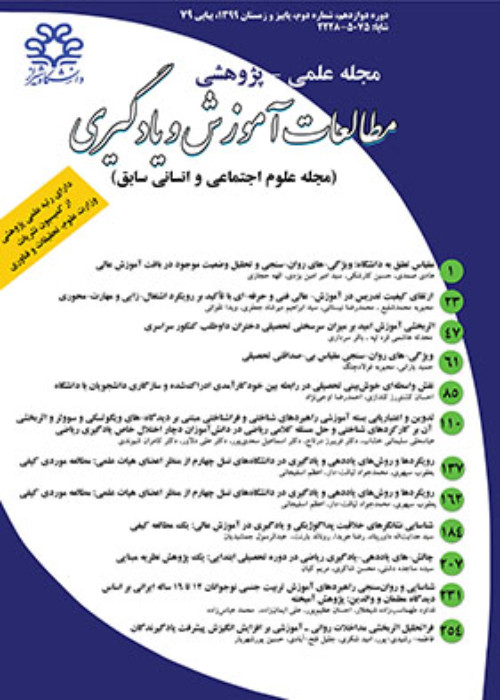The Relationship between Autonomy-Supportive Environment and Art Students’ Positive Achievement Emotions during Covid-19 Pandemic: The Mediating Role of Achievement Goals
Students are exposed to a spectrum of emotional experiences, namely joy, pride, hope, anxiety, shame, and boredom, within academic settings. These emotions are currently referred to as achievement emotions. While previous studies have largely overlooked these emotions, with the exception of test anxiety and those related to success and failure, recent research has underscored their influential role in attention, decision-making, memory, problem-solving, well-being, and the academic performance of students. Indeed, positive emotions, which are defined as pleasant emotions, can enhance one’s agentic engagement, self-efficacy, self-regulation, and academic achievement. Therefore, it is of paramount importance to identify the factors that can predict positive achievement emotions. In light of the control-value theory of achievement emotions and existing research, environments that support autonomy have the potential to facilitate positive achievement emotions through perceived control and value beliefs. Such an environment enables students to engage voluntarily in an activity and perceive its control and value by fostering a sense of autonomy. Moreover, achievement goals can serve as mediators in this relationship. In other words, environments that support autonomy, where students are given the freedom to decide their course of action, encourage students to select assignments they either wish to master or outperform others in (i.e., mastery and performance-approach goals). These goals, which instil a perception of control over academic performance and elevate the value of learning assignments, will increase the likelihood of positive emotions. Conversely, by suppressing performance-avoidance goals, which could potentially undermine perceived control and value, these environments can enhance the aforementioned emotions. However, this specific model has yet to be studied. Given the circumstances during the Covid-19 pandemic, where students have been confined indoors and subjected to online instruction, which tends to be less structured than face-to-face classes, their performance, emotions, motivation, and engagement could be significantly impacted. Furthermore, due to the content and demands of arts classes, which necessitate the development of dexterity and skills, students participating in such online classes are at a higher risk of emotional problems. Thus, it appears even more crucial to explore emotions in these settings and determine their antecedents. To this end, the present study investigated the predictive role of an autonomy-supportive environment in positive achievement emotions (i.e., hope, pride, and joy) among arts students and the mediating role of achievement goals in this relationship.
The current study employs a correlational approach and utilizes a structural equation model. This model includes the autonomy-supportive environment as the predictor, achievement goals as the mediator, and positive achievement emotions as the criterion variable. The research population of the study comprised all students of arts studies at Neyshabour Arts School and Mashhad Islamic Azad College of Arts. Due to social distancing measures and institutional closures amid the Covid-19 pandemic, and in accordance with Kline’s criterion for sample size in structural equation modelling (which suggests 10 to 20 respondents per estimated parameter), a convenient sample of 320 students was selected. These students were asked to complete the online Persian version of the Autonomy-Supportive Environment Questionnaire, the Positive Achievement Emotions subscale of the Achievement Emotions Questionnaire, and the Personal Achievement Goals Orientation derived from Patterns of Adaptive Learning Scales, if they wished to participate. Participants were informed about the purpose of the study and assured that the data collected through the aforementioned questionnaires would remain confidential and only be accessible to the researchers. Descriptive statistics were used, and structural equation modelling was conducted to analyze the data and test the hypotheses.
The results indicated that the proposed research model was a good fit with the data. Furthermore, it was found that the autonomy-supportive environment could directly predict the positive achievement emotions of arts students. It was also revealed that achievement goals partially mediated the relationship between the autonomy-supportive environment and positive achievement emotions. Therefore, both hypotheses of the study were confirmed.
In light of the findings, it can be concluded that supporting students’ autonomy, specifically in online educational environments and in arts classes, is crucial as it can facilitate the occurrence of positive achievement emotions via the achievement goals they choose to pursue. In other words, creating environments where students are given the opportunity for choice, criticism, and examination of goals, values, and interests can encourage them to set mastery and performance-approach goals. Such goals will likely increase the chances of experiencing positive achievement emotions. Conversely, autonomy-supportive environments can weaken performance-avoidance goals, which are considered detrimental to students’ emotions. As a result, these environments can foster positive emotional experiences among students. It is therefore suggested that the Ministry of Science, Research, and Technology should prioritize the study of how to develop autonomy-supportive environments and apply the findings to all institutes. Moreover, future research should focus on the relationship between autonomy-supportive environments and other types of emotions (e.g., epistemic emotions and social emotions) across various educational contexts to further elaborate on the importance of such environments.
- حق عضویت دریافتی صرف حمایت از نشریات عضو و نگهداری، تکمیل و توسعه مگیران میشود.
- پرداخت حق اشتراک و دانلود مقالات اجازه بازنشر آن در سایر رسانههای چاپی و دیجیتال را به کاربر نمیدهد.



